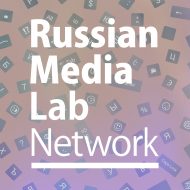Project researcher Marielle Wijermars will be presenting her research on data activism at the ECREA conference “Digital Democracy: Critical Perspectives in the Age of Big Data” (Södertörn University, 10-11 November). Paper: The Complexities of Open Government Adoption in Hybrid Regimes: Aleksei Navalny and Data Activism in Russia
Author Archives: ninto
Russian Media Lab at ASEEES, 9-12 November, Chicago
The Russian Media Lab will be at ASEEES from 9-12 November in Chicago. The latest version of the programme can be consulted on the Conference website. Saara Ratilainen – Round table “New Forms in Digital Storytelling” New Forms in Digital Storytelling explores the latest tendencies in computer-mediated storytelling that include cross-platform projects, narrative VR, multi-POV, …
Continue reading “Russian Media Lab at ASEEES, 9-12 November, Chicago”
Russian Media Lab at the Aleksanteri Conference – 25-27 October 2017, University of Helsinki
The Russian Media Lab is well-represented at this year’s Aleksanteri Conference. The project is hosting two panels and one round table, featuring presentations by our researchers, network partners and invited guests. Further details on our panels can be found below. Please consult the Conference website for the latest version of the programme. We look forward …
Political Art in the Age of Post-Truth Propaganda
The Russian Media Lab has initiated a collaboration with the international art project “States of Control” curated by the St. Petersburg-based Creative Association of Curators (TOK). Upon invitation by TOK’s Anna Bitkina and Maria Veits, project researcher Saara Ratilainen took part in the performative talk show “I’ve Got the Power!” on 19 August 2017. States …
Continue reading “Political Art in the Age of Post-Truth Propaganda”
Reminder: CfP special issue ‘Women and Tech in Post-Soviet Contexts’
Some two weeks remain to submit your abstract for the special issue ‘Women and Tech in Post-Soviet Contexts: Intelligence, Creativity, Transgression.’ For this special issue of Digital Icons: Studies in Russian, Eurasian and Central European New Media we invite contributions on themes, including: Female coders Women in software developer communities Gender representation of hacktivism Women …
Continue reading “Reminder: CfP special issue ‘Women and Tech in Post-Soviet Contexts’”
Russian Media Lab Seminar “Freedom of Speech and Critical Journalism in Russia” – 24 October, Helsinki
Russian Media Lab Seminar FREEDOM OF SPEECH AND CRITICAL JOURNALISM IN RUSSIA Taking Stock of Current Realities 24 October 2017 – 14:00-17:30 hours @University of Helsinki, Aleksanteri Institute, 2nd floor (Unioninkatu 33) The Russian Media Lab is hosting an afternoon seminar on freedom of speech and critical journalism in Russia to precede the Aleksanteri Conference …
Moving on with Meduza: Transnational Russian-language Media and Freedom of Speech in Russia
An interview with Editor-in-Chief Ivan Kolpakov In an exclusive interview with Vlad Strukov, Ivan Kolpakov, Editor-in-Chief of Meduza, discusses the current editorial trajectory of the online media outlet. Watch the full interview below, or read excerpts from the interview that reveal what it means to be an independent media active on the Russian market – economically …
CfP: Special issue on Women and Tech in the Post-Soviet Context
Call for Papers: Special issue on ‘Women and Tech in the Post-Soviet Context: Intelligence, Creativity, Transgression’, Studies in Russian, Eurasian, and Central-European New Media (www.digitalicons.org) The development of the internet as a democratizing tool fostering freedom of information, grass-roots activism, and peer-to-peer support is closely related to and engrained in hacker communities. In the early …
Continue reading “CfP: Special issue on Women and Tech in the Post-Soviet Context”
Interview with Ellen Rutten
by Mariëlle Wijermars Ellen Rutten is Professor of Literature, with a focus on Slavonic literature and culture, at the University of Amsterdam. Her latest book, Sincerity after Communism: A Cultural History, was published by Yale University Press earlier this year. Could you tell a bit about your work relating to Russia and media? In my new …
Media Managers on the Effects of State Regulation
May 12 2017 Written by Marina Galkina Russian media managers see the state’s increasing attempts to control the media as the main trend in communications in Russia. The restriction of and influence on media companies’ activities take place not only through direct political influence, but also by means of economic policy (e.g., import substitution, state …
Continue reading “Media Managers on the Effects of State Regulation”
